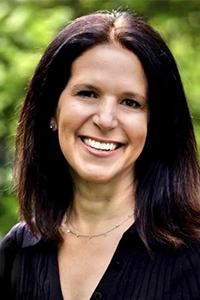Psychotherapy has many special qualities that have resonated with me for a very long time. Being in a meaningful relationship that has allowed me to reveal my real self, free of feeling of judged or pressured, has had tremendous value in my life.
Through my own process of therapy, I was able to uncover parts of my inner world that I had previously kept more hidden. As my understanding of myself has grown over the years, so has my ability to trust and accept myself. Professionally, I have developed ways of opening this kind of experience up to others, which is something that continuously gives me great energy and satisfaction.
As I was growing up, I worked hard to maintain a certain image of myself—-the eternal optimist, easy-going, sensitive to others’ needs, never too difficult. This way of being helped me to feel appreciated and loved by others. I was committed to making things feel as easy as possible for my family and all people close to me. I tried to not have big needs so that I could continue to receive the love that I probably wondered deep down if I would still get if I stepped out of this image.
I also came to recognize that some of the things that happened in the generations before me in my family had a greater impact on my inner world than I had previously realized. This is largely because of the unspeakable nature of my family’s history. My father’s side of our family survived the Holocaust, having narrowly escaped the horrors of what happened to a majority of the Jewish community around them. When I was younger, I used to see what happened to my family as just part of our story—simply having been Jews in Europe during this most horrific time in history. This has since evolved for me. Over the years, I have gained a greater understanding of who my father is and what caused him to shape his life in ways that helped bring back a sense of control over his destiny.
On mother’s side of my family, there had been a painful struggle with depression. At the time, treatment for mental illnesses was far less developed, so therapeutic options weren’t widely available. Suffering with mental illness was usually handled through the most basic forms of medication or electroconvulsive therapy (ECT) and hospitalization. These experiences left people in my family feeling helpless and not knowing how to address the painful feelings that had surfaced. My mother’s family coped directly with not only the pain, but also the stigmas and judgments that tended to overwhelm these kinds of mental health crises.
I was very fortunate that there was a strong sense of kindness and love in the family I came from. We had a strong ethic of family and togetherness, which greatly helped to counteract the challenges and pain that everyone had been through.
I have become aware that many people have equal levels of complexity living within them and that the experience of real love in a family can also be mixed with trauma. We learn first how to live within the families we are from. As adults, we work hard not to put our pain or insecurities onto the people close to us. Without help though, it is difficult to gain perspective or fully understand the forces that influence how we relate to ourselves and to others. The gift of modern psychotherapy is the realization that none of us can work through these complex personal pieces on our own. It is in the special conditions created in the therapeutic relationship that we can rework and transform these very deep and personal aspects of ourselves.
Karen Klein, MSW, LCSW-C has been practicing psychotherapy for 20 years. Karen received her Masters in Clinical Social Work from the University of Maryland, Baltimore and her Bachelors in Psychology from American University. Karen is a Maryland State Licensed Clinical Social Worker and a member of the Greater Washington Society for Clinical Social Work and the Mid-Atlantic Group Psychotherapy Society. She has offices in Ellicott City and Rockville where she works with individuals and families. She also co-leads ongoing therapy process groups.


